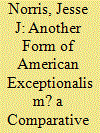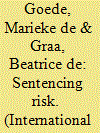|
|
|
Sort Order |
|
|
|
Items / Page
|
|
|
|
|
|
|
| Srl | Item |
| 1 |
ID:
183018


|
|
|
|
|
| Summary/Abstract |
Sting operations can potentially thwart terrorist plots, but could also threaten civil liberties and alienate communities, making them a critical subject for counterterrorism research. Yet despite considerable research on U.S. cases, little is known about terrorism stings elsewhere. How common are such cases abroad, and how many feature strong entrapment claims or result in entrapment-related acquittals? In this study, data are gathered about non-U.S. terrorism stings, each of which is evaluated for entrapment indicators. Results show that, contrary to claims of American exceptionalism, terrorism stings could be identified in twenty-one countries, and the average number of entrapment indicators per case is similar between the U.S. and several countries. In addition, several non-U.S. cases present entrapment claims as strong as some of the most-criticized U.S. cases. However, relatively few non-U.S. terrorism stings (fifty-one) could be identified, while there are 156 U.S. cases. In addition, unlike in the U.S., courts have acquitted defendants on entrapment grounds in a high proportion of non-U.S. cases. Political, cultural, and legal differences between the U.S. and other countries, and certain cross-national commonalities, are identified as likely accounting for these results. Potential implications of these findings for terrorism prevention and legal reform are considered.
|
|
|
|
|
|
|
|
|
|
|
|
|
|
|
|
| 2 |
ID:
124426


|
|
|
|
|
| Publication |
2013.
|
| Summary/Abstract |
In debates on the preemptive measures of the war on terror, criminal law is often regarded as the antithesis to exception-a conventional mode of response that acts on the basis of past harm. Since September 11, 2001, however, significant new terrorism laws have been adopted in most countries in order to make possible the disruption and prosecution of potential terrorists engaged in preparatory activities. Thus, ancillary acts undertaken increasingly in advance of actual violence are brought within the remit of criminal law. This paper engages the question of the precautionary turn in criminal law itself, and how it plays out in actual courtrooms. We examine the terrorist trial as a performative space where potential future terror is imagined, invoked, contested, and made real. By focusing on the cases of the Hofstad group in the Netherlands, and the Rhyme trials in the UK, the paper examines how present criminal offenses involving terrorist aims and intent are constituted through the appeal to potential future violence. In conclusion, the paper teases out the political dynamic of secondary risk management that-frequently-underlies contemporary terrorism prosecutions.
|
|
|
|
|
|
|
|
|
|
|
|
|
|
|
|
|
|
|
|
|